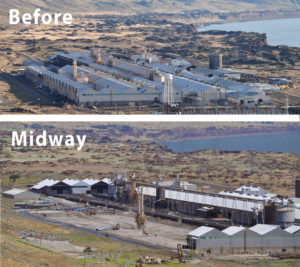What happens to a 1.2-million-square-foot aluminum plant when skyrocketing energy costs force its doors closed forever?
 In the wrong hands, it could become a massive pile of rubble languishing in a landfill. However, when the Goldendale Aluminum Plant in southern Washington shut down in 2003, the owners insisted on hiring industrial demolition contractors who could dismantle the plant with a minimal amount of waste sent to the landfill. That meant thousands of tons of materials – and truckloads of usable equipment – would need to be carefully extracted, sorted, processed and repurposed or recycled.
In the wrong hands, it could become a massive pile of rubble languishing in a landfill. However, when the Goldendale Aluminum Plant in southern Washington shut down in 2003, the owners insisted on hiring industrial demolition contractors who could dismantle the plant with a minimal amount of waste sent to the landfill. That meant thousands of tons of materials – and truckloads of usable equipment – would need to be carefully extracted, sorted, processed and repurposed or recycled.
It was a project J.D. Elder, president of Elder Demolition, had been preparing for since starting the company in 1997. Back then, the contractor specialized in selective demolition of interior commercial spaces. Their previous work involved meticulously picking apart materials in tight urban spaces. Elder invested in state-of-the-art shears and other equipment that offered almost surgical precision.
Owning the right equipment paid off as the company transitioned to total structural demolition of industrial and commercial buildings. For eco-conscious industrial demolition contractors, Oregon offers plenty of green demolition opportunities – and Elder’s crew is often able to reuse or recycle up to 95 percent of a job’s materials. So when the bid for the Goldendale plant came around, they were ready.
Aftermath of Industrial Demolition
The Goldendale Aluminum Plant project was easily the largest job J.D. and his brother, Jeff Elder, had ever undertaken. By the time the contractors finished taking apart, they were left with 147,000 tons of debris, including:
- 100,000 tons of concrete.
- 35,000 tons of structural steel.
- 10,000 tons of aluminum siding, roofing cable, conduit and copper wire.
- Boilers and other usable equipment.
 Repurposing Materials from the Goldendale Aluminum Plant
Repurposing Materials from the Goldendale Aluminum Plant
To deal with the 100,000 tons of concrete, Elder’s crew went to work with concrete shears. It took close to six months to remove all the rebar and slice the material into 3-inch chunks for crushing, Jeff Elder said. These were then loaded into the company’s concrete crusher, which chewed them up into gravel. Instead of purchasing new gravel, the Elder brothers reused all of the crushed concrete onsite to level the land – a cost-effective as well as eco-friendly solution. (J.D. Elder notes that the public can buy crushed concrete for half the price of gravel for their own DIY projects.)
There were also truckloads of perfectly functional industrial equipment salvaged from the plant. Ultimately, an entire building’s worth of machinery was sold for reuse. The steel, aluminum, copper, roofing cable and siding were all recycled. In the end, only 2,000 tons of debris went into the landfill – a mere 1 percent of the total demolished materials.
The RE Store’s green demolition and salvage services haven’t ever taken on a project this large, but we have worked with major demolition companies like Nuprecon and others.
Thanks to Elder Demolition for their guest post. Elder Demolition is a fully licensed and insured commercial and industrial demolition company, with certifications for hazardous waste handling as well as broad experience with LEED-certified green demolitions.
